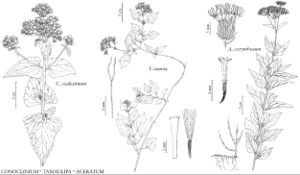Conoclinium
in A. P. de Candolle and A. L. P. P. de Candolle, Prodr. 5: 135. 1836.
| Taxon | Illustrator ⠉ | |
|---|---|---|
 | Conoclinium dissectum Tamaulipa azurea Ageratum corymbosum | Linny Heagy Linny Heagy Linny Heagy |
Perennials, 50–200 cm (usually rhizomatous, colonial, rhizomes relatively slender). Stems erect to decumbent (sometimes rooting at proximal nodes), not much branched distal to bases. Leaves cauline; opposite; petiolate; blades usually 3-nerved from bases, deltate, oblanceolate, ovate, ovate-deltate, oblong, or triangular, margins dentate or lobed (to dissected in C. dissectum), faces glabrate to puberulous, villosulous, or hispidulous, glanddotted. Heads discoid, in tight, corymbiform arrays. Involucres hemispheric, 3–6 mm diam. Phyllaries persistent, ca. 25 in 2–3 series, obscurely 2–3-nerved, lanceolate to linear, ± equal (herbaceous). Receptacles conic, epaleate. Florets 35–70+; corollas usually blue to purple or violet, rarely white, throats narrowly funnelform (lengths ca. 4 times diams.); styles: bases not enlarged, glabrous, branches filiform to linear-clavate. Cypselae prismatic (bases narrowed), 5-ribbed, glabrous or sparsely glanddotted and/or hispidulous; pappi persistent, of ca. 30 barbellate bristles in 1 series. x = 10.
Distribution
sw, e North America, Mexico
Discussion
Species 4 (3 in the flora).
Selected References
Key
| 1 | Leaf blades deeply dissected or lobed (lobes dentate, apices sharply pointed or rounded) | Conoclinium dissectum |
| 1 | Leaf blades serrate to dentate or crenate (not dissected or lobed) | > 2 |
| 2 | Leaf blades usually oblong to oblong-lanceolate, sometimes triangular, bases truncate to cordate (often subauriculate), apices rounded to obtuse; tips of pappus bristles dilated | Conoclinium betonicifolium |
| 2 | Leaf blades triangular to deltate or ovate, bases usually cuneate to truncate, rarely subcordate (not subauriculate), apices acute; tips of pappus bristles not dilated | Conoclinium coelestinum |
"fine" is not a number.